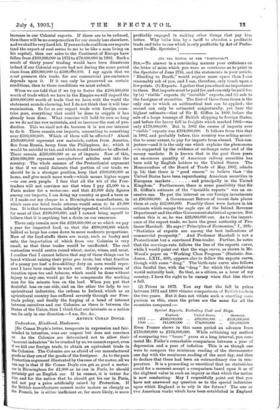[TO TIM EDITOR OF TIM "SPROTATOR.1 Sin,—To answer in a
convincing manner your criticisms on the letter of mine which you were so courteous as to print in the Spectator of June 27th, and the statements in your article, "Bleeding to Death," would require more space than I can reasonably ask of you, and I can, therefore, only touch upon a few points. (1) Exports. I gather that you attach no importance to these. But imports must be paid for, and can only be paid for, by (a) "visible" exports, (b) "invisible" exports, and (c) sale to the foreigner of securities. The first of these three items is the only one to which an arithmetical test can be applied; the second can only be estimated conjecturally, yet here the highest estimate—that of Sir R. Giffen in 1899, before the sale of a large tonnage of British shipping to foreign States, and before the heavy fall in freights which marked 1902—was only 2178,000,000. But in 1902 the excess of imports' over " visible " exports was 2184,000,000. It follows from this that in 1902, and probably before, this country was selling securi- ties to some extent, to pay for imports from abroad. This con- jecture—and it is the only one which explains the phenomena —is supported by the evidence of exchange rates and of the money markets. It is known that in the past three years an enormous quantity of American railway securities has been sold by English holders to the United States. The Memorandum of the Board of Trade of May, 1902, admits (p. 14) that there is "good reason" to believe that "the United States have been repurchasing American securities in
European markets and principally in the United Kingdom." Furthermore, there is some possibility that Sir R. Giffen's estimate of the "invisible exports" was an ex- cessive one. He put the interest on our foreign investments at 290,000,000. A Government Return of becent date places them at only 262,000,000. Possibly there were factors in his estimate which escape the eagle eye of the Inland Revenue Department and the other Government statistical agencies. But unless this is so, he was 228,000,000 out. As to the import- ance of the export trade, we have the great authority of Pro- fessor Marshall. He says (" Principles of Economics," I., 268) : "Statistics of exports are among the best indications of commercial prosperity." And Professor Marshall is not a Protectionist but a convinced Free-trader. Further, he notes that the marriage-rate follows the line of the exports curve, while I would point out that the wage curve, as shown in Mr. Wood's paper on "Working Class Progress" (Statistic. Soc. Journ., LXII., 660), appears also to follow the exports curve, though with some "drag." The birth-rate curve also follows this fateful line, with the " drag " for which the statistician would naturally look. So that, as a citizen, as a lover of my country, I have the right to be uneasy when that line shows a fall.
(2) Prices in 1872. You say that the fall in prices between 1872 and 1900 vitiates comparisons of British trade in the two years. But it does not vitiate such a startling com- parison as this, since the prices are the same for all the countries compared :— Special Exports, Excluding Coal and Ships.
England. United States.
• Germany.
1872 4246,000,000 ... £89,000,000 ... £108,000,000 1900 241,000,000 ... 274,000,000 ... 220,000,000 Even France shows in this same period an advance from 2150,000,000 to 2164,000,000. While criticising my method of comparing two " boom " years at a long interval, you com- mend Mr. Fuller's remarkable comparison between a year of depression and a year of inflation. This is as though one were to compare the minimum reading of the thermometer one day with the maximum reading of the next day, and then to declare that there had been an extraordinary rise in tern-' perature. It is a proceeding so uncritical that no statistician 'could for a moment accept a comparison based upon it as of the slightest value in such an inquiry as that which the nation is now conducting. May I respectfully point out that you have not answered my question as to the special industries upon which England is to rely in the future? The one or two American works which have been established in England will not support forty-two million souls. At this very moment our great Sheffield industries are being invited by an American agency to move to Illinois, inside the tariff wall, and thus to
It is clear that what Mr. Wilson calls invisible exports must have been much larger than he estimates, because if not our capital would have been wasting away, and we know that instead it has been increasing. This is not conjecture, but an ascertained fact. The Income-tax returns show beyond any doubt that our capital is increasing, not decreasing. If it were otherwise, the Income-tax would yield less, not more, per penny each year. The same is true of the Death-duties. England will rely in the future, as in the past, on the great industries, such as shipbuilding, the carrying trade, the iron trade, the coal trade, and the cotton trade. The prosperity of those trades will, no doubt, not prevent prosperity abroad, but there is no sign that our industries are dying. On the con-
trary, they were never in a healthier state. We are aware that in certain of the trades named the sales to foreign nations are not increasing, but thanks to the internal pros- perity we enjoy owing to Free-trade the home market is con- stantly improving.—En. Spectator.]











































 Previous page
Previous page